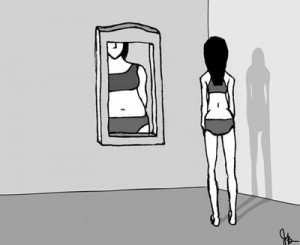Anorexia nervosa is perhaps the Eating Disorder that is best known to the public. It is a very dangerous illness that causes a person to intentionally deprive themself of food. This is potentially life threatening as people with this eating disorder can literally starve themselves to death. Somebody with Anorexia is unable to ever reach a point where they feel “thin” enough. They are driven by an obsession to lose weight, and this is the defining feature of the eating disorder. If somebody is about 15% below a healthy weight for their height and age and are refusing to make healthy improvements to this they might be considered to have Anorexia.
Even though they might be emaciated and severely undernourished the person with the anorexia eating disorder remains convinced that they are unacceptably “fat”. Their entire self-esteem and self-worth is tied up in their body weight and how they perceive their body. Weight loss gives an anorexic a sense of achievement and control, whereas weight gain leaves them feeling out of control and worthless.
Anorexia Nervosa is usually first displayed in puberty. It can often be linked to a very stressful life event, although this shouldn’t be considered to be the “cause” of this eating disorder. The great majority of cases of anorexia are female although there is an increasingly number of males being diagnosed. Males with anorexia can develop life-threatening medical complications, perhaps because they tend to be diagnosed only much later than females.
Anorexics are obsessed with reducing their weight and will go to great lengths to achieve this. They will reduce their food and calorie intake, eschewing meals in favour of salad or other low-calorie snacks. Anorexics will cut out a great amount of food and limit themselves only to a few specific foods that they believe are “safe” to eat and won’t cause them to gain weight. Certain anorexics will purge after eating in order to avoid digesting the food that they have just eaten and will refuse to eat in public or even with friends and family. Despite their aversion to food an anorexic may become obsessed with it. It is fairly common to see anorexics hoarding food, or preparing meals for other people without ever even tasting the food.
Serious health risks of Anorexia Nervosa
Anorexia is an eating disorder with very serious implications associated with nutritional deficiencies. Heart problems are amongst the leading medical cause of death in people with severe anorexia. As a result of starvation the muscles of the heart become too weak to continue pumping. Other problems that arise in people with anorexia include damage to the central nervous system, seizures, cognitive deficits, and peripheral nerve damage.
Scans will show that the brain is undergoing structural changes as a result of the abnormal behaviour brought about by anorexia. Although some of these changes can be returned to normal there is evidence that some brain damage may be irreversible.
Additionally anorexic patients are more susceptible to developing psychological disorders such as major depression. This exacerbates the existing emotional and physical disturbance and worsens their self-esteem which heightens their need for hyper-vigilance over their eating in an effort to control their mood and self-esteem. This vicious cycle can be very difficult to break. Tragically, suicide is a leading cause of death in anorexia nervosa.
Although our medicine does not yet have a complete cure for anorexia nervosa this is an illness from which people do recover if it is caught early and treated effectively.
Anorexia Nervosa : Recognizing symptoms
Anorexia Nervosa presents in two different forms. The first type of anorexia, the “restricting type” accomplish weight loss primarily through restricting their nutritional intake through dieting, fasting, or excessive exercise. The second type of anorexia, the “binge-eating/purging type” will regularly engage in episodes where they consume a large amount of food (a “binge”) and then subsequently purging the food from their system by self-induced vomiting, laxative abuse, diuretics, or other methods. Anorexics who suffer from the binge-eating/purging type of the eating disorder double their risk of early death.
Symptoms of both types of anorexia include:
- Significant weight loss (not explained by another reason)
- A significant loss of appetite or refusal to eat coupled with a denial of hunger
- A highly restrictive diet while being under ideal body weight
- Unusual or secretive eating habits
- An excessive and uncompromising exercise routine
- An obsession with self-appearance and constantly weighing oneself
- Depression
- Insomnia
- Digestive problems – constipation or bloating
- Reduced sex drive
- Feeling the cold
- Withdrawing or avoiding social contact
- Irritable mood
- Hormonal difficulties
The physical symptoms of anorexia are those that are associated with the starvation that accompanies this eating disorder. These include fatigue, lowered heart rate and body temperature, a slower heart rhythym, a lower rate of metabolism, tooth erosion, infections, loss of menses, growth of fine hair on the face and back, loss of hair from the scalp, skin conditions, osteoporosis, and kidney problems.
Anorexia Nervosa : Causes
There is no single, specific, cause of Anorexia nervosa and it appears to arise as a result of a complex interplay of factors. Factors that have been identified as possibly being associated with this eating disorder include emotional and personality development and family stress. A hypothetical link to genetic susceptibility has been proposed but not yet fully demonstrated. A constant stream of messages about the “ideal” look from society can certainly contribute to the development of Anorexia nervosa.
Treatment of Anorexia Nervosa
A patient with Anorexia Nervosa must be assessed by a physician to immediately treat any of the physical problems that may have arisen from the starvation. Sometimes a doctor will insist that a patient is admitted to hospital, not only for safety but also to ensure that their eating can be observed and monitored. Anorexia Nervosa is a multi-faceted eating disorder that has an impact on many areas of life. An effective treatment for Anorexia will comprehensively address the biological, social, familial, psychological, vocational, and other factors that are implicated in the illness. This may require close collaboration between professionals from various clinical disciplines: doctors, dieticians, therapists, and psychiatrists.
Denial of the problem is very common in patients diagnosed with anorexia nervosa. Even though a patient may need to be hospitalized to deal with life-threatening health complications they may steadfastly refuse to acknowledge that they have a problem. Sometimes they may have received encouragement for being thin from friends or athletic coaches and this affirmation will need to be countered.
An effective therapist is generally one who is specialized in helping people with this eating disorder. Therapy needs to be conducted in a safe, non-judgemental, and completely confidential setting to allow the anorexic the freedom to explore their life. Treatment for anorexia nervosa needs to be focused, concentrated, and intense if it is going to effectively address all of the emotional and psychological underpinnings of this eating disorder.
Patients with anorexia nervosa will often feel very guilty or ashamed about their illness. Part of treatment will be to help the patient start to feel more accepting of themself. The family will also be involved as they are generally under considerable stress as a result of watching a loved one literally starve to death. Family therapy will also help the family to become aware of how they can support the anorexic.









